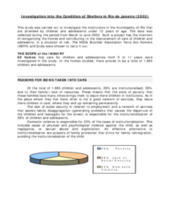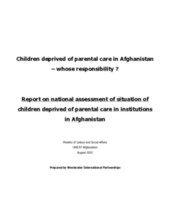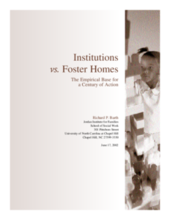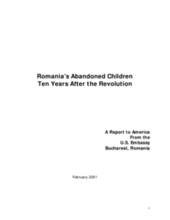Displaying 631 - 640 of 662
This paper outlines the International Save the Children Alliance’s position on residential care. It addresses the proliferation of residential care, its negative impact on children and the need for international attention. The paper presents the work of Save the Children and other agencies in order to highlight relevent issues and to provide a guide for those working with separated children.
Provides an overview of social service provision in Eastern Europe and Central Asia, and provides information on ways to move resources away from institutional care, and into community-based social services. Contains specific examples from Latvia, Iceland, Sweden, Romania and other transitioning countries.
This research study provides statistical information on institutional care of children under the age of 12 in Rio de Janeiro, Brazil. Interviews with institutions and children are conducted, and reasons for separation from family, length of time in care, status of family relationship, religious orientation and financial support of the institutions are highlighted.
This report is the result of a seminar held in Kazakhstan 2004. It focuses on social welfare sector reform, and includes topics such as expanding legislative agendas and financing frameworks, as well as gate keeping. Case studies of reform processes from Romania, Tajikistan and Serbia are discussed. Includes conference agenda.
Situation analysis of Afghan children living in institutional care. Includes detailed recommendations for strengthening policies and services in the child welfare system.
This paper provides a guideline for the implementation of reunification and reintegration programs for agencies providing institutional care for orphans. It outlines the different strategies and activities an organization in Ethiopia used to transition from institutional care to community-based childcare projects.
This report details the situation of disappearing children during the El Salvadorian civil war. It describes the process of tracing and reunifying children with their families, as well as alternative care arrangements for separated children.
A review of institutional care and family-centered care with a discussion of both positive and negative aspects of group care. This review paper is primarily focused on showing the inefficacy of group care and recommending other forms of care such as kinship care and even foster care as options that are more cost effective and better for children’s development.
An account of the massive child welfare crisis in Romania which erupted from a movement in Romania during its communist regime to institutionalize thousands of children. This paper also reports the efforts of NGO’s, PVO’s and the international communities to reverse the damage after the fall of communism and also where the efforts need to be directed.
A paper describing a program developed by the IRC in Rwanda for orphans and vulnerable children and youth with a particular focus on minimizing placement of children into centers and finding durable solutions for those already in institutions. The paper discusses IRC’s strategies, and the different components of the program, evaluates the program in the context of Rwanda and offers recommendations to those interested in emulating IRC’s Rwanda program.










